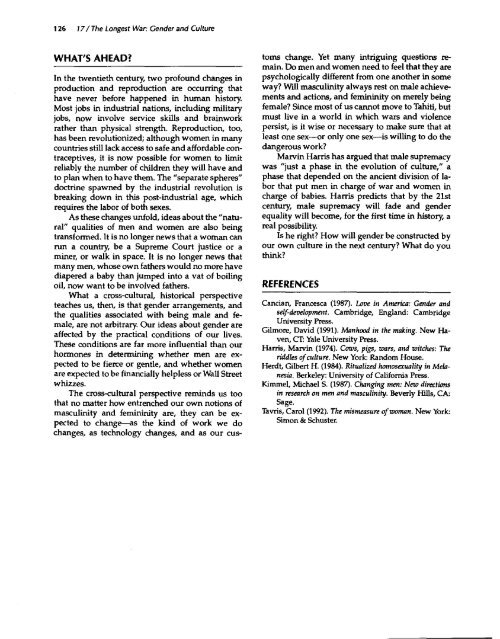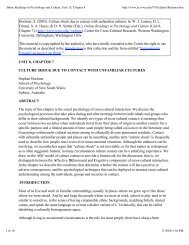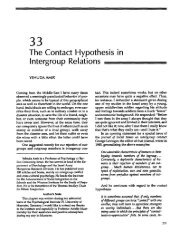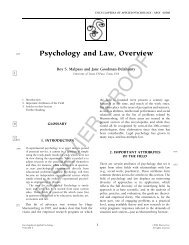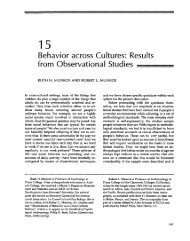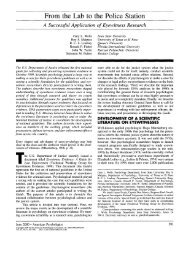The Longest War: Gender and Culture
The Longest War: Gender and Culture
The Longest War: Gender and Culture
Create successful ePaper yourself
Turn your PDF publications into a flip-book with our unique Google optimized e-Paper software.
126 17/ <strong>The</strong> <strong>Longest</strong> <strong>War</strong>: <strong>Gender</strong> <strong>and</strong> <strong>Culture</strong><br />
WHAT'S AHEAD<br />
In the twentieth century, two profound changes in<br />
production <strong>and</strong> reproduction are occurring that<br />
have never before happened in human history.<br />
Most jobs in industrial nations, including military<br />
jobs, now involve service skills <strong>and</strong> brainwork<br />
rather than physical strength. Reproduction, too,<br />
has been revolutionized; although women in many<br />
countries still lack access to safe <strong>and</strong> affordable contraceptives,<br />
it is now possible for women to limit<br />
reliably the number of children they will have <strong>and</strong><br />
to plan when to have them. <strong>The</strong> "separate spheres"<br />
doctrine spawned by the industrial revolution is<br />
breaking down in this post-industrial age, which<br />
requires the labor of both sexes.<br />
As these changes unfold, ideas about the "natural"<br />
qualities of men <strong>and</strong> women are also being<br />
transformed. It is no longer news that a woman can<br />
run a country, be a Supreme Court justice or a<br />
miner, or walk in space. It is no longer news that<br />
many men, whose own fathers would no more have<br />
diapered a baby than jumped into a vat of boiling<br />
oil, now want to be involved fathers.<br />
What a cross-cultural, historical perspective<br />
teaches us, then, is that gender arrangements, <strong>and</strong><br />
the qualities associated with being male <strong>and</strong> female,<br />
are not arbitrary. Our ideas about gender are<br />
affected by the practical conditions of our lives.<br />
<strong>The</strong>se conditions are far more influential than our<br />
hormones in determining whether men are expected<br />
to be fierce or gentle, <strong>and</strong> whether women<br />
are expected to be financially helpless or Wall Street<br />
whizzes.<br />
<strong>The</strong> cross-cultural perspective reminds us too<br />
that no matter how entrenched our own notions of<br />
masculinity <strong>and</strong> femininity are, they can be expected<br />
to change~~ the kind of work we do<br />
changes, as technology changes, <strong>and</strong> as our cus-<br />
toms change. Yet many intriguing questions remain.<br />
Do men <strong>and</strong> women need to feel that they are<br />
psychologically different from one another in some<br />
way Will masculinity always rest on male achievements<br />
<strong>and</strong> actions, <strong>and</strong> femininity on merely being<br />
female Since most of us cannot move to Tahiti, but<br />
must live in a world in which wars <strong>and</strong> violence<br />
persist, is it wise or necessary to make sure that at<br />
least one sexÑo only one sex-is willing to do the<br />
dangerous work<br />
Marvin Harris has argued that male supremacy<br />
was "just a phase in the evolution of culture," a<br />
phase that depended on the ancient division of labor<br />
that put men in charge of war <strong>and</strong> women in<br />
charge of babies. Harris predicts that by the 21st<br />
century, male supremacy will fade <strong>and</strong> gender<br />
equality will become, for the first time in history, a<br />
real possibility.<br />
Is he right How will gender be constructed by<br />
our own culture in the next century What do you<br />
think<br />
REFERENCES<br />
Cancian, Francesca (1987). Love in America: <strong>Gender</strong> <strong>and</strong><br />
self-development. Cambridge, Engl<strong>and</strong>: Cambridge<br />
University Press.<br />
Gilmore, David (1991). Manhood in the making. New Haven,<br />
CT: Yale University Press.<br />
Harris, Marvin (1974). Cows, pigs, wars, <strong>and</strong> witchis: <strong>The</strong><br />
riddles of culture. New York: R<strong>and</strong>om House.<br />
Herdt, Gilbert H. (1984). Ritualized hosexuality in Melanesia.<br />
Berkeley: University of California Press.<br />
Kimmel, Michael S. (1987). Changing men: New directions<br />
in research on men <strong>and</strong> masculinity. Beverly Hills, CA:<br />
Sage.<br />
Tavris, Carol (1992). <strong>The</strong> mismeasure of woman. New York:<br />
Simon & Schuster.


